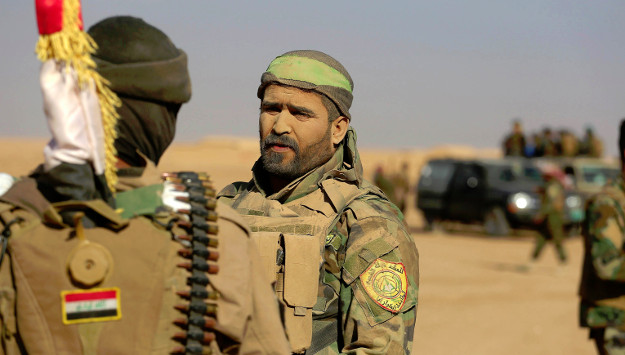With Shiite militia forces scoring territorial gains in Iraq and Syria, the Islamic Revolution Guards Corps (IRGC) feels vindicated. In numerous interviews with Iranian media outlets, senior IRGC officials claim that their support for the Popular Mobilization Forces (PMF) in Iraq and Shiite militant groups in Syria has not only saved the two countries from “terrorists and takfiris” but has also warded off the threat of terrorism from spilling over into the Iranian territory.
Brigadier General Naser Shabani, the deputy head for operations of IRGC’s Sarallah Base, told Tasnim News Agency on November 30 that the IRGC propped up militia forces to “change dynamics” inside Syria and Iraq and secure Iran. “Today, we have gone to aid the oppressed people of Iraq and Syria, and with their assistance have crushed the enemy along the Israeli border,” he added, reasoning that “If we don’t defeat the enemy along the Israeli border, we’ll need to confront them in the Persian Gulf.”
Last week, Mohammad Ali Asoodi, Supreme Leader Ali Khamenei’s representative to the IRGC, told a gathering of senior Basij commanders that IRGC Quds Force commanders Qassem Suleimani and Hossein Hamadani (killed in Syria in 2015) helped create the PMF in Iraq and Shiite militant groups in Syria respectively in order to defeat terrorism and safeguard Iranian borders. “Today, Syria is the rearguard of the Islamic Republic… Until the enemy conquers it [Syria], it cannot harm us,” he said in response to critics inside Iran who question the wisdom of IRGC’s growing involvement in the Syrian and Iraqi wars.
The PMF is an umbrella of largely Shiite militant groups fighting the Islamic State. While some factions such as Asaib Ahl al-Haq, the Badr Brigade and Kata'ib Hezbollah are closely linked with the IRGC, many are independent and follow the direction of Iraq’s Grand Ayatollah Ali Sistani. Shiite militia groups have been instrumental in liberating several Iraqi cities from the Islamic State, but many Iraqis and Sunni regional leaders fear that Iran is using the groups to dominate Iraqi politics and security. And with PMF’s growing involvement in the Mosul fight, they are concerned that the militias might engage in sectarian killings once the Islamic State is defeated.
The Iraqi parliament’s recent decision to legalize the militia fighters as a government entity has only exacerbated those concerns. Members of Sunni block in the Iraqi parliament described the legislation as another proof of “sectarianism” and “Iran’s triumph” in Iraq that would undermine “political settlement” and unity in the country. (More here, here, and here.)



